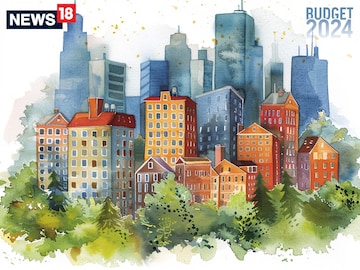SOURCE : NEW18 NEWS
Last Updated:January 18, 2025, 13:34 IST
Budget 2025: Real estate developers throughout the country have highlighted several key demands, including the long-awaited grant of industry status, rationalisation of stamp duty, redefinition of affordable housing, incentives for green housing, and enhanced tax exemptions.
Here are the key expectations of the real estate from the upcoming Union Budget 2025-26.
As Finance Minister Nirmala Sitharaman prepares to present the Union Budget 2025-26 on February 1, the real estate industry has outlined its expectations, focusing on measures to spur growth, streamline processes, and support affordable housing. The realty developers throughout the country have highlighted several key demands, including the long-awaited grant of industry status, rationalisation of stamp duty, redefinition of affordable housing, incentives for green housing, and enhanced tax exemptions.
Here are the key expectations of the real estate from the upcoming Union Budget 2025-26:
related stories
Granting Industry Status
The real estate sector has reiterated its demand for industry status, which stakeholders believe would unlock institutional capital and provide access to low-cost financing.
Amit Modi, director of County Group, said, “One of the most long-standing demands the sector emphasises upon is the need to grant industry status to enable easier access to low-cost financing, which benefits consumers directly. Additionally, implementing single-window clearance is crucial for timely project completion and cost efficiency.”
Stating that granting the ‘industry’ status is a vital step, Vivek Singhal, CEO of Smartworld Developers, said, “The move would unlock greater access to institutional capital, stimulating growth across the entire value chain, including over 200 interdependent industries.”
Saurab Saharan, group managing director of HCBS Developments, highlighted the sector’s employment potential, noting, “As a major employer, particularly of unskilled labour, this move would accelerate growth and strengthen the sector’s contribution to the economy.”
Affordable Housing: Redefinition Needed
The redefinition of affordable housing parameters is a pressing demand.
Sudhir Pai, CEO of Magicbricks, said, “Revising the affordable housing price limit in metro cities from Rs 45 lakh to Rs 65 lakh would allow a larger segment of buyers to access government incentives, thereby driving residential demand.”
Manoj Gaur, president of CREDAI NCR and CMD of Gaurs Group, further elaborated, “Instead of focusing on price cap (the current ₹45 lakh limit is too little, given the pricing trends and variance in land cost from one town/city to another), it should emphasise carpet area, that is, 60 sqm in the metros and 90 sqm in non-metro cities.”
He said incentivising real estate developers in the form of income tax rebates to undertake affordable housing projects and the reintroduction of a 100 per cent tax holiday, which was available for projects approved before March 31, 2022, are other measures that can provide a fillip to affordable housing.”
Sachin Gawri, founder and CEO of RISE Infraventures, echoed these sentiments, proposing that the affordable housing limit be revised to Rs 80 lakh and calling for tax incentives to boost supply.
Higher Home Loan Tax Deduction Limits
The industry has called for an increase in the home loan interest exemption limit. Smartworld’s Vivek Singhal noted, “Increasing the tax deduction limit for housing loan interest under Section 24(b) to Rs 5 lakh would align with the rising aspirations of homebuyers while addressing evolving market conditions.”
Manoj Gaur also emphasised the need for revisions under Section 80C, stating, “A revision of the current deduction limit from ₹1.5 lakh to ₹5 lakh under Section 80C to ease homeownership experience should also be considered.”
Rationalisation of Stamp Duty
The rising stamp duty has become a significant concern for both developers and homebuyers.
Manoj Gaur, president of CREDAI NCR and CMD of Gaurs Group, said, “One of the major demands of the sector is the rationalisation of stamp duty, which has increased significantly in recent years and is causing a big financial burden on buyers.”
Support for Green Housing and Infrastructure
Sustainable development has emerged as a priority for the sector. Rahul Singla, Director of Mapsko Group, said, “To enhance liquidity, relaxed financing norms and credit support for stalled projects are critical to restoring buyer confidence. Incentives for green building initiatives can encourage sustainable practices, while investments in infrastructure across tier-2 and tier-3 cities can promote regional growth and improve housing access.”
Pavan Kumar, Founder & CEO of White Lotus Group, added, “A focus on incentivising green housing and sustainable developments will encourage eco-conscious practices, ensuring India aligns with global sustainability benchmarks.”
Addressing Stalled Projects and Liquidity
Resolving the issue of stalled projects remains a key concern. Sandeep Agarwal, Executive Director, Finance & Group CFO of Elan Group, emphasised, “This budget presents an opportunity to tackle some of the sector’s pressing challenges. Resolving the long-standing issue of stalled projects must be prioritised to rebuild trust among homebuyers.”
The real estate sector, contributing nearly 8 per cent to India’s GDP, plays a pivotal role in driving economic growth and job creation.
Mohit Agarwal, business head of Conscient, said, “We hope the upcoming Budget will introduce initiatives aimed at boosting demand within the residential real estate market, a vital pillar of India’s economic growth. By prioritising tax relief, improved access to finance, and incentives to boost liquidity in the market, the 2025-26 Budget can further strengthen the real estate sector’s contribution to India’s overall economic development and ensure continued growth and stability.”
Viren Mehta, director of ElitePro Infra, said, “For homebuyers, tax reliefs and simplified tax systems can be helpful especially for first time homebuyers. Key priorities of the upcoming budget include increasing the income tax deduction limit for home loan interest under Section 24(B), incentives for green building projects, and rationalisation of GST rates for under – construction properties.”






